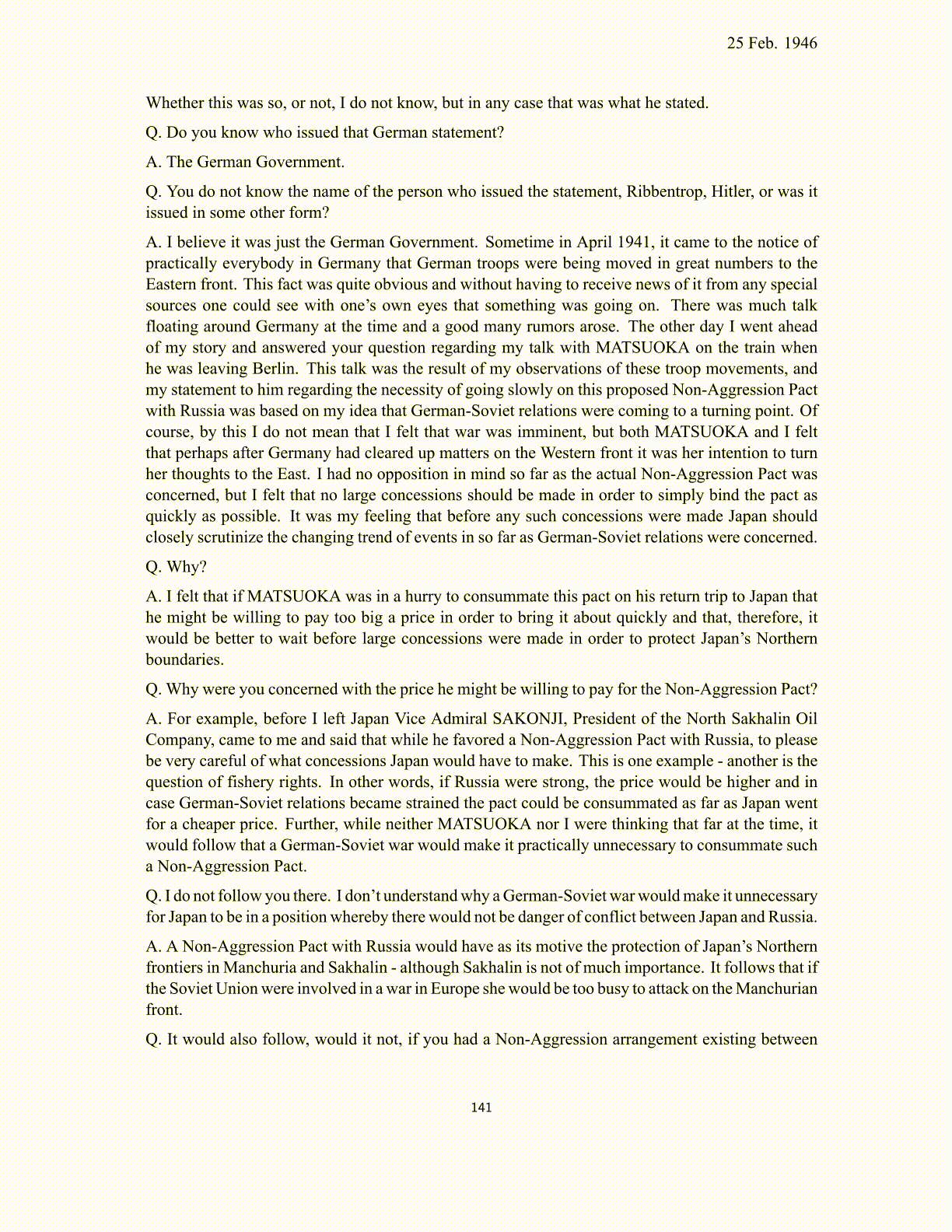
25 Feb. 1946 Whether this was so, or not, I do not know, but in any case that was what he stated. Q. Do you know who issued that German statement? A. The German Government. Q. You do not know the name of the person who issued the statement, Ribbentrop, Hitler, or was it issued in some other form? A. I believe it was just the German Government. Sometime in April 1941, it came to the notice of practically everybody in Germany that German troops were being moved in great numbers to the Eastern front. This fact was quite obvious and without having to receive news of it from any special sources one could see with one’s own eyes that something was going on. There was much talk floating around Germany at the time and a good many rumors arose. The other day I went ahead of my story and answered your question regarding my talk with MATSUOKA on the train when he was leaving Berlin. This talk was the result of my observations of these troop movements, and my statement to him regarding the necessity of going slowly on this proposed Non-Aggression Pact with Russia was based on my idea that German-Soviet relations were coming to a turning point. Of course, by this I do not mean that I felt that war was imminent, but both MATSUOKA and I felt that perhaps after Germany had cleared up matters on the Western front it was her intention to turn her thoughts to the East. I had no opposition in mind so far as the actual Non-Aggression Pact was concerned, but I felt that no large concessions should be made in order to simply bind the pact as quickly as possible. It was my feeling that before any such concessions were made Japan should closely scrutinize the changing trend of events in so far as German-Soviet relations were concerned. Q. Why? A. I felt that if MATSUOKA was in a hurry to consummate this pact on his return trip to Japan that he might be willing to pay too big a price in order to bring it about quickly and that, therefore, it would be better to wait before large concessions were made in order to protect Japan’s Northern boundaries. Q. Why were you concerned with the price he might be willing to pay for the Non-Aggression Pact? A. For example, before I left Japan Vice Admiral SAKONJI, President of the North Sakhalin Oil Company, came to me and said that while he favored a Non-Aggression Pact with Russia, to please be very careful of what concessions Japan would have to make. This is one example - another is the question of fishery rights. In other words, if Russia were strong, the price would be higher and in case German-Soviet relations became strained the pact could be consummated as far as Japan went for a cheaper price. Further, while neither MATSUOKA nor I were thinking that far at the time, it would follow that a German-Soviet war would make it practically unnecessary to consummate such a Non-Aggression Pact. Q. I do not follow you there. I don’t understand why a German-Soviet war would make it unnecessary for Japan to be in a position whereby there would not be danger of conflict between Japan and Russia. A. A Non-Aggression Pact with Russia would have as its motive the protection of Japan’s Northern frontiers in Manchuria and Sakhalin - although Sakhalin is not of much importance. It follows that if the Soviet Union were involved in a war in Europe she would be too busy to attack on the Manchurian front. Q. It would also follow, would it not, if you had a Non-Aggression arrangement existing between 141